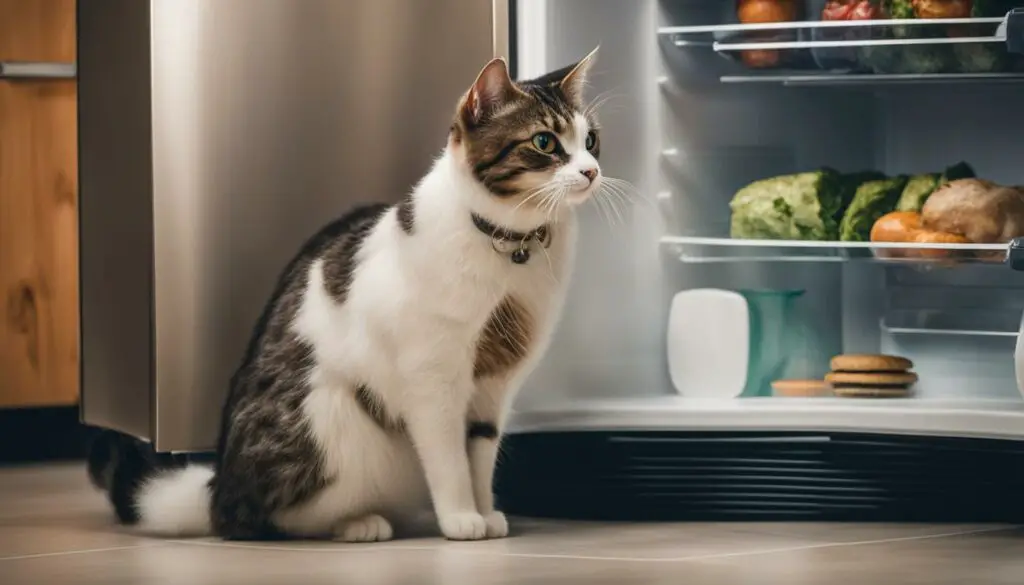Are you tired of your cat constantly meowing for food? You’re not alone. Many cat owners face this common issue and wonder why their feline friends can’t seem to stop vocalizing their hunger. In this article, I will address some of the common queries surrounding cats’ constant meowing for food and provide insights into the possible reasons behind it.
Key Takeaways:
- Cats meow as a form of communication, but excessive meowing may indicate an underlying issue.
- Reasons for a cat constantly meowing for food include hunger, attention-seeking behavior, stress, or medical conditions.
- Understanding the cause of your cat’s meowing is crucial in addressing the behavior appropriately.
- Consulting with a veterinarian can help determine if there are any medical conditions contributing to the excessive meowing.
- Environmental enrichment and behavior modification techniques can play a role in managing your cat’s meowing behavior.
Why Does My Cat Keep Meowing?
When it comes to understanding why your cat keeps meowing, there are several reasons to consider. Cats have different ways of communicating, and meowing is one of their primary methods. Some common reasons for meowing include hunger, thirst, loneliness, and boredom. It’s also possible that your cat is meowing to seek attention or to indicate that they want to go out or play.
To truly understand why your cat keeps meowing, it’s important to consider their specific circumstances. Certain medical conditions such as pain, urinary issues, kidney disease, or hyperthyroidism can also cause excessive meowing in cats. Additionally, factors like breed traits, mating habits, and learned behavior can contribute to your cat’s meowing habits.
By paying attention to the timing, frequency, and nature of your cat’s meowing, you can gain valuable insights into their needs and behavior. It’s always a good idea to consult with a veterinarian if you’re concerned about your cat’s meowing. They can help determine the underlying cause and provide guidance on how to address it.
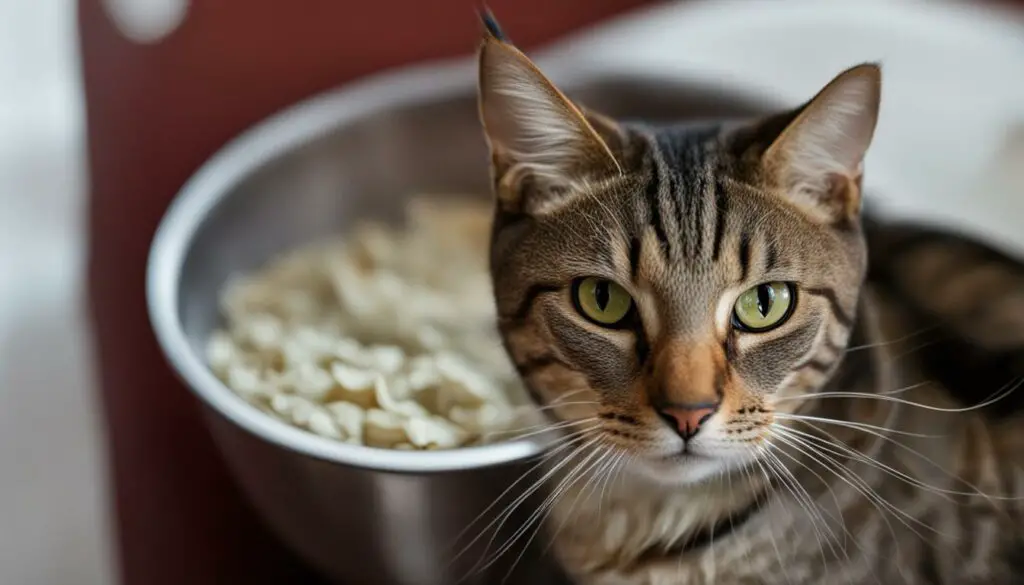
Understanding why your cat keeps meowing is essential for their overall well-being. By addressing their needs, whether it’s providing enough food and water, ensuring they have companionship, or seeking medical attention when necessary, you can help reduce excessive meowing and create a harmonious environment for you and your feline friend.
Why Is My Cat Meowing at Night?
Many cat owners experience their feline friends meowing at night, and it can be quite disruptive to their sleep. Understanding the reasons behind this behavior can help address it effectively. Here are some common reasons why your cat may be meowing at night:
- Hunger: Cats are typically more active during the night, and they may meow to communicate their hunger or desire for food.
- Attention-seeking behavior: Some cats may meow at night to seek attention from their owners. This can be a learned behavior if they have been rewarded with attention in the past.
- Boredom: Cats are naturally curious and need mental stimulation. If they do not have enough opportunities to play or explore during the day, they may become restless and meow at night.
- Medical issues: Nighttime meowing can also be a sign of underlying medical problems such as hypertension or hyperthyroidism. It’s important to monitor your cat’s overall health and consult a veterinarian if you suspect an underlying medical condition.
To address your cat’s nighttime meowing, it’s crucial to rule out any medical issues first. Schedule a visit to the veterinarian to ensure that your cat is healthy and there are no underlying health concerns. Once medical issues are ruled out, you can focus on providing environmental enrichment and establishing a consistent nighttime routine for your cat.
Creating a calm and comfortable environment for your cat during the night can help reduce meowing. Ensure that your cat has access to a cozy sleeping area, provide interactive toys to keep them mentally stimulated during the day, and establish a regular feeding schedule. Additionally, spending quality time with your cat during the evening can help fulfill their need for attention and play, reducing their meowing at night.
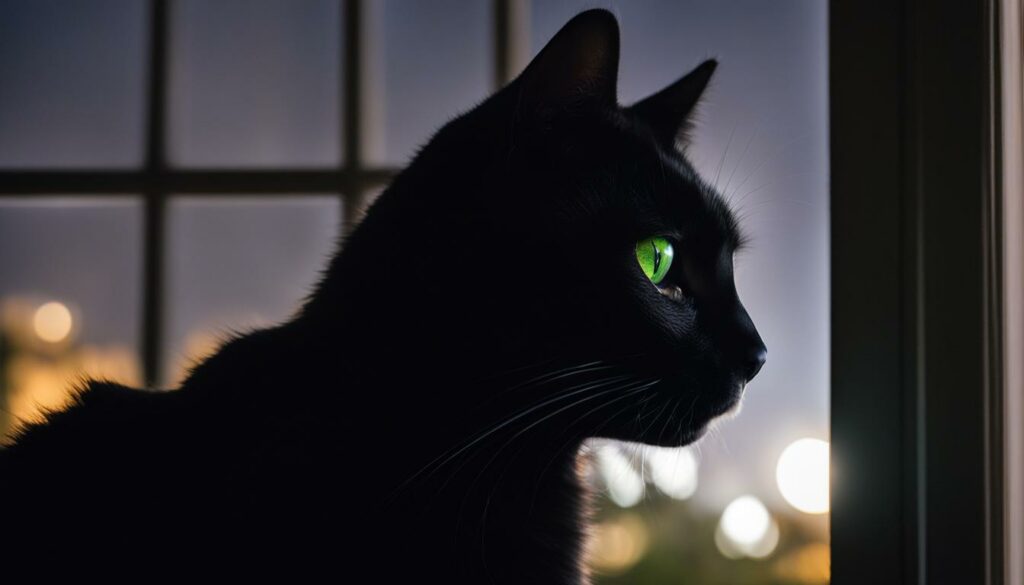
Table: Common Reasons for Nighttime Cat Meowing
| Reason | Description |
|---|---|
| Hunger | Cats may meow at night to communicate their hunger or desire for food. |
| Attention-seeking behavior | Certain cats may meow at night to seek attention from their owners. |
| Boredom | If cats do not have enough opportunities to play or explore during the day, they may become restless and meow at night. |
| Medical issues | Nighttime meowing can be a sign of underlying medical problems such as hypertension or hyperthyroidism. |
Why Is My Kitten Meowing So Much?
If you have a new kitten that is meowing excessively, there can be several reasons behind this behavior. Understanding why your kitten is meowing can help you address their needs and ensure their well-being. Here are some common reasons for excessive meowing in kittens:
Attention and Communication
Kittens use meowing as a way to communicate with their owners. They may meow to get your attention, express their needs, or seek interaction. Since they are still developing their communication skills, they may rely on meowing more frequently than adult cats. However, if the meowing becomes excessive or seems distressed, it is important to pay attention and determine if there are any underlying issues causing their distress.
Separation Anxiety
Kittens may experience separation anxiety when they are away from their mother or littermates. This anxiety can manifest as excessive meowing and may indicate that your kitten is feeling lonely or stressed. Providing them with a safe and comforting environment, along with plenty of toys and enrichment activities, can help alleviate their anxiety and reduce excessive meowing.
Hunger and Thirst
Kittens have small stomachs and may need to eat more frequently compared to adult cats. If your kitten is meowing excessively, it could be a sign that they are hungry or thirsty. Ensuring that they have access to fresh water and providing regular feeding times can help address their nutritional needs and reduce excessive meowing.
Health Issues
In some cases, excessive meowing in kittens can be a sign of underlying health issues. Kittens may meow more if they are in pain, discomfort, or experiencing digestive problems. It is important to monitor their overall health, appetite, litter box habits, and consult a veterinarian if you suspect any health issues that may be causing their excessive meowing.
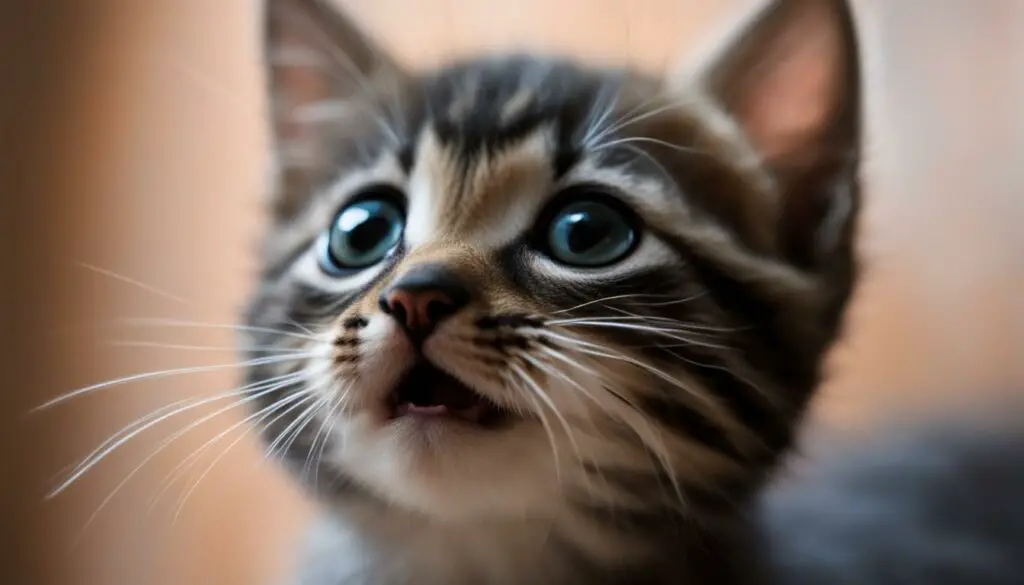
Conclusion
Excessive meowing in kittens can be a normal part of their development or indicate underlying issues. By understanding the reasons behind your kitten’s meowing and addressing their needs, you can help create a safe and comfortable environment for them to thrive. Remember to provide them with proper nutrition, regular playtime and social interaction, and consult a veterinarian if you have any concerns about their health or behavior.
Why Is My Cat Always Hungry and Meowing?
If your cat is constantly hungry and meowing, it’s important to understand the reasons behind this behavior. While it’s normal for cats to have a healthy appetite, excessive hunger and meowing may indicate an underlying issue that needs attention. There are several potential causes for a cat always being hungry and meowing, including medical conditions and behavioral factors.
Medical Conditions
One possible reason for your cat’s constant hunger and meowing is an underlying medical condition. Conditions such as hyperthyroidism or kidney disease can cause increased appetite and excessive meowing. It’s essential to monitor your cat’s weight, appetite, and thirst levels. If you notice any significant changes, it’s recommended to consult a veterinarian for a proper diagnosis and treatment plan.
Behavioral Factors
In addition to medical conditions, behavioral factors can also contribute to your cat’s constant hunger and meowing. Cats may associate meowing with getting food and attention, so if they receive reinforcement for this behavior, it may continue. It’s important to establish a feeding routine and avoid rewarding attention-seeking meowing. Providing mental and physical stimulation through interactive toys and playtime can also help reduce excessive hunger and meowing in cats.
Remember, every cat is unique, and the reasons for constant hunger and meowing may vary. It’s crucial to observe your cat’s behavior, consult a veterinarian if needed, and make any necessary adjustments to ensure their well-being.
| Potential Causes | Symptoms | Action |
|---|---|---|
| Hyperthyroidism | Increased appetite, weight loss, excessive meowing | Consult a veterinarian for diagnosis and treatment options |
| Kidney Disease | Increased thirst, weight loss, excessive meowing | Seek veterinary care for proper diagnosis and treatment |
| Behavioral factors | Attention-seeking meowing, meowing at specific times | Establish a feeding routine, avoid rewarding meowing, provide mental and physical stimulation |
Why Is My Cat Meowing Differently?
If you’ve noticed that your cat’s meow sounds hoarse or different than usual, it could indicate an underlying health issue. Cats can develop upper respiratory infections, laryngitis, or other conditions that affect their vocal cords, leading to a change in their meowing. It’s important to be attentive to these changes and take appropriate action to ensure your cat’s well-being.
When your cat’s meow sounds different, it’s advisable to have them examined by a veterinarian. A professional evaluation can help determine the exact cause of the change in vocalization and provide appropriate treatment. Whether it’s a temporary infection or a more chronic condition, early intervention can prevent further complications and discomfort for your furry friend.
Remember, cats may not always show obvious signs of illness, so paying attention to changes in vocalization is crucial. In addition to a hoarse meow, other symptoms to watch out for include coughing, sneezing, difficulty breathing, or a loss of appetite. If you notice any of these signs, it’s best to consult with a veterinarian promptly.
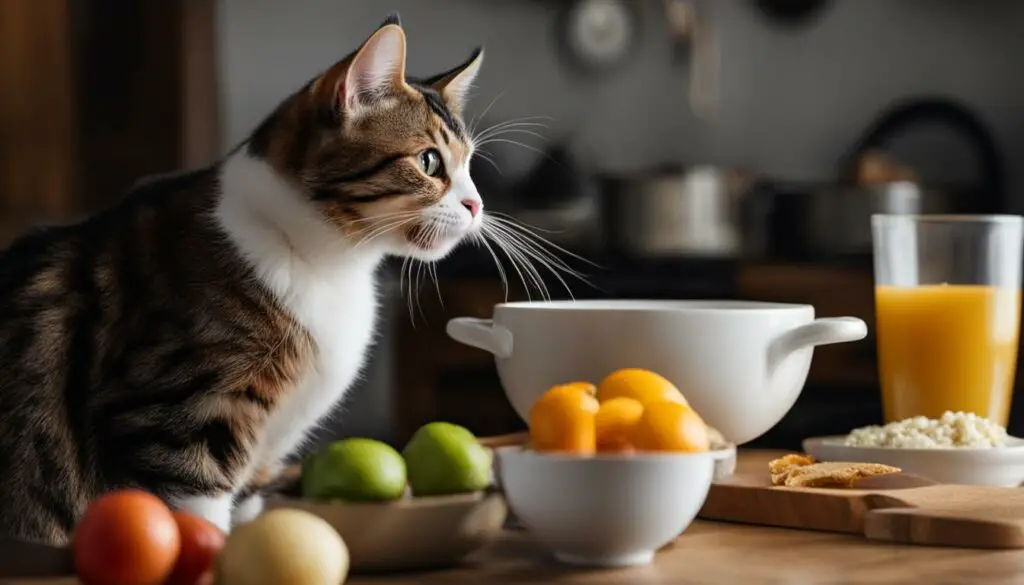
By addressing the changes in your cat’s meowing, you can ensure their health and well-being. Consult with a veterinarian to accurately diagnose the underlying cause and provide the appropriate treatment. With the right care and attention, your cat can regain their normal vocalization and continue to thrive as part of your family.
Why Is My Male Cat Yowling?
If you have a male cat that is yowling, it’s important to understand that this behavior is often driven by hormonal factors. Male cats may yowl when they are looking for a mate, especially if they are not neutered. This yowling is a natural instinct and is the cat’s way of communicating their readiness to reproduce. While this behavior can be noisy and disruptive, it can be significantly reduced or eliminated by having your cat neutered.
Neutering, also known as castration, involves surgically removing the testicles from a male cat. This procedure not only prevents unwanted pregnancies but also helps to reduce or eliminate the hormonal drive behind yowling behavior. Neutered male cats are generally calmer and less likely to engage in excessive vocalization related to mating.
It’s worth noting that female cats may also yowl when they are in heat. This is their way of attracting a mate and can be equally disruptive. Spaying, or removing the ovaries and uterus, can prevent this behavior in female cats. By spaying your female cat, you can avoid unnecessary yowling and the potential for unwanted litters.
| Pros of Neutering: | Pros of Spaying: |
|---|---|
| Reduces or eliminates yowling behavior in male cats | Prevents excessive yowling in female cats |
| Helps reduce roaming and aggressive behavior in male cats | Eliminates the risk of unwanted pregnancies |
| Reduces the risk of testicular cancer and other health issues in male cats | Prevents uterine infections and certain types of cancer in female cats |
In addition to preventing unwanted behaviors and health issues, spaying or neutering your cat has many other benefits, including reducing the overall cat population and potentially reducing the risk of certain diseases. It’s important to consult with your veterinarian to determine the appropriate age and timing for spaying or neutering your cat, as well as any potential risks or considerations specific to your pet.
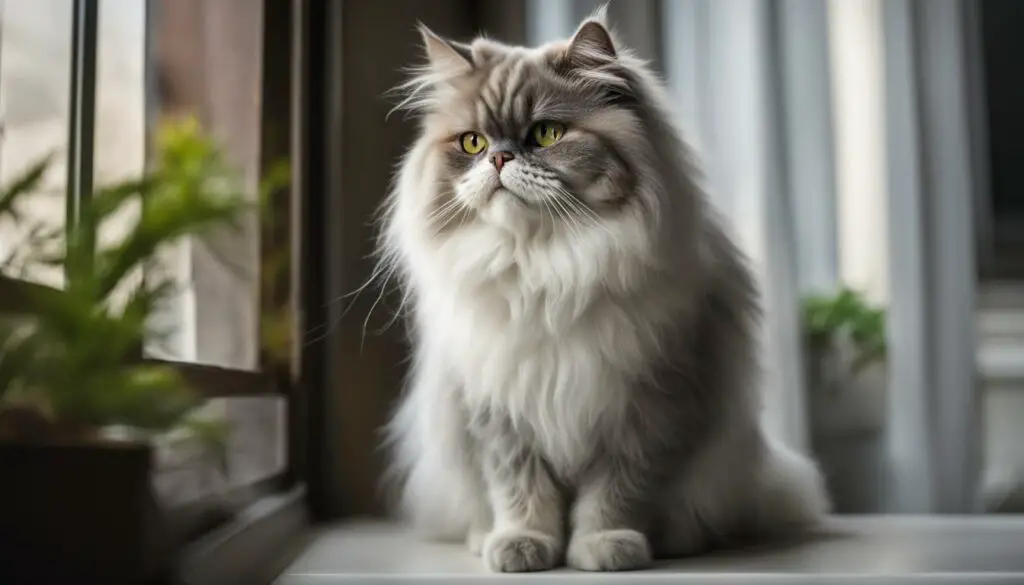
Summary:
Male cats may yowl due to hormonal factors associated with mating. Neutering can help reduce or eliminate this behavior, as well as other unwanted behaviors in male cats. Female cats may also yowl when in heat, but spaying eliminates this behavior and prevents unwanted pregnancies. Spaying or neutering your cat has numerous benefits, including reducing the risk of certain diseases and preventing overpopulation.
What to Do if Your Cat Won’t Stop Meowing
If your cat won’t stop meowing, it’s important to address this behavior to ensure their well-being and restore peace in your home. Here are some steps you can take to address excessive meowing:
Assess the Basic Needs
First, make sure that your cat’s basic needs are being met. Ensure they have access to fresh food, water, and a clean litter box. Lack of these necessities can cause stress and lead to excessive meowing as your cat tries to communicate their needs.
Avoid Reinforcing Attention-Seeking Behavior
It’s crucial not to reward your cat’s attention-seeking meows. If you constantly give in to their demands, it reinforces the behavior and encourages them to meow even more. Instead, wait for a moment of silence before giving them attention or food. This helps teach your cat that meowing does not result in immediate gratification.
Consider Behavior Modification Techniques
If your cat’s excessive meowing persists, you may need to use behavior modification techniques. These techniques focus on positive reinforcement and consistent training. For example, you can reward your cat with treats or praise when they remain quiet for a certain period. Over time, they will learn that being quiet leads to rewards, reducing their meowing behavior.
Consult a Veterinarian
If your cat’s meowing continues despite your efforts, it’s advisable to consult a veterinarian. Excessive meowing can sometimes be a sign of an underlying medical condition, such as hyperthyroidism or urinary issues. A veterinarian can conduct a thorough examination and provide appropriate treatment if necessary.
Taking these steps can help address your cat’s excessive meowing and improve their quality of life. Remember to be patient and consistent in your approach, as behavior modification may take time. By understanding the reasons behind your cat’s meowing and taking appropriate action, you can restore harmony in your home and ensure your furry friend’s well-being.
Questions to Ask If Your Cat Keeps Meowing
If your cat is constantly meowing, it’s important to understand their behavior and the underlying reasons behind it. By asking specific questions about when and where your cat meows, you can gain valuable insights into their triggers and the possible causes of their excessive meowing.
Timing
Consider the timing of your cat’s meowing. Do they meow more frequently during certain times of the day or night? Are they more vocal before or after mealtime? Understanding their meowing patterns can help identify if hunger or schedule-related factors are contributing to their behavior.
Location
Take note of where your cat meows the most. Do they meow near their food bowl or litter box? Are they constantly meowing at the door or windows? This can provide insight into whether they are seeking attention, food, or interaction, or if they are expressing a desire to explore the outdoors.
Spaying/Neutering Status
If your cat is not spayed or neutered, their meowing could be related to mating behaviors. Unaltered male cats may yowl to attract mates, while female cats in heat may meow excessively. Considering their spaying/neutering status can help determine if hormonal behavior is a contributing factor.
Breed and Personality
Some cat breeds are known for being more vocal than others. Understanding your cat’s breed traits can shed light on why they meow more frequently. Additionally, each cat has their own unique personality, and their meowing may be an inherent part of their communication style.
Litter Box and Playtime
Ensure that your cat’s litter box is clean and easily accessible. Some cats may meow if they are experiencing discomfort or if they need to use the litter box. Additionally, providing regular playtime and environmental stimulation can help alleviate boredom and reduce meowing behaviors.
Summary
By asking questions about your cat’s meowing, you can gain a better understanding of their behavior and the reasons behind it. Factors such as timing, location, spaying/neutering status, breed, litter box cleanliness, and playtime can provide valuable clues. This information can help you address your cat’s excessive meowing and improve their overall well-being.
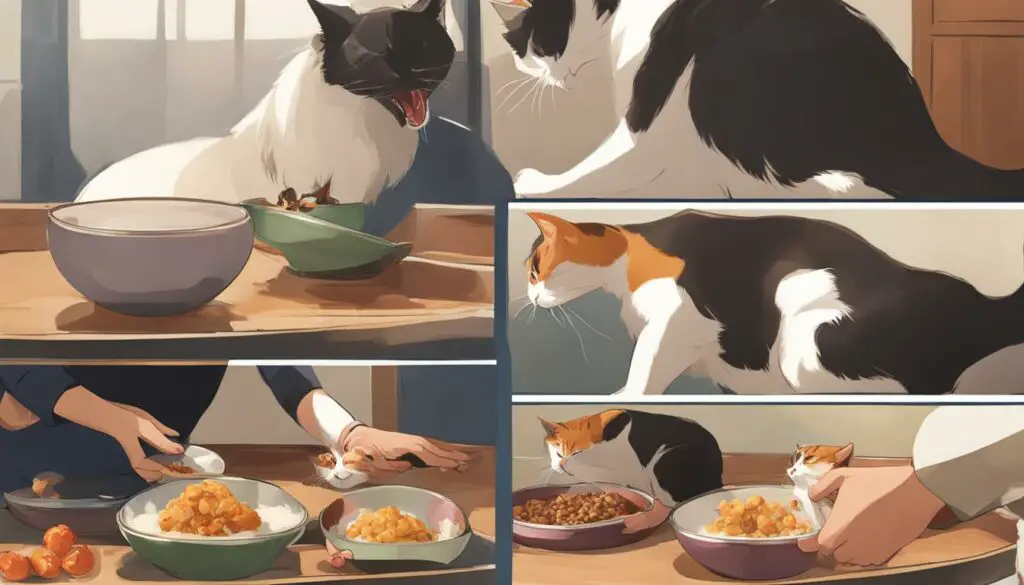
Main Causes of Excessive Meowing: Insights from Vets
Excessive meowing in cats can be a cause for concern, and veterinary professionals can provide valuable insights into understanding the reasons behind this behavior. While some meowing is normal, excessive meowing may indicate underlying issues that require attention. Consultation with a veterinarian is essential to determine the cause of excessive meowing and rule out any medical conditions that may be contributing to this behavior.
Veterinary experts have identified several main causes of excessive meowing in cats. These include hunger, attention-seeking behavior, stress, mating habits, and medical conditions. It is crucial to address each of these factors individually to effectively manage and reduce excessive meowing.
Hunger:
Cats may meow excessively if they are hungry or have an increased appetite due to a medical condition such as hyperthyroidism. It is important to ensure that your cat’s nutritional needs are met and that they are receiving a balanced diet.
Attention-seeking behavior:
Cats are known for their independent nature, but they may resort to excessive meowing as a way to seek attention from their owners. Engaging in regular play sessions, providing interactive toys, and spending quality time with your cat can help meet their emotional needs and reduce attention-seeking meowing.
Stress:
Cats can become stressed due to various factors such as changes in their environment, introduction of new pets, or loud noises. Excessive meowing may be a sign of their distress. Creating a calm and secure environment for your cat, with secluded resting places and comforting scents, can help reduce stress and alleviate excessive meowing.
By addressing these main causes of excessive meowing, you can help improve your cat’s well-being and maintain a harmonious relationship with them. Remember to consult with a veterinarian for personalized advice and guidance tailored to your cat’s specific needs and circumstances.
Environmental Enrichment and Behavior Modification
Addressing excessive meowing in cats requires a multi-faceted approach, including environmental enrichment and behavior modification techniques. These strategies aim to provide mental and physical stimulation, alleviate boredom, and redirect your cat’s attention away from excessive meowing. By implementing these methods, you can help improve your cat’s overall well-being and reduce their need for constant meowing.
Environmental Enrichment
Creating an enriched environment for your cat can help keep them mentally stimulated and engaged. Consider providing interactive toys that encourage physical activity and mental stimulation. Puzzle feeders can also be beneficial, as they require your cat to work for their food, keeping them entertained and satisfied. Additionally, providing a variety of scratching posts and perches can fulfill your cat’s natural climbing and scratching instincts.
Creating a designated play area with toys and hiding spots can help keep your cat entertained and stimulated throughout the day. Regularly rotating toys and introducing new objects can prevent boredom and maintain your cat’s interest. By enriching your cat’s environment, you can help reduce their attention-seeking behavior, including excessive meowing.
Behavior Modification
Behavior modification techniques can be effective in addressing excessive meowing in cats. Positive reinforcement, such as rewarding your cat with treats or praise when they exhibit calm behavior, can help reinforce desired behaviors and discourage excessive meowing. Consistency is key when implementing behavior modification techniques, ensuring that everyone in the household follows the same approach.
Redirecting your cat’s attention when they start meowing excessively can also be helpful. Engage them in play or offer interactive toys to distract them from meowing. By providing alternative outlets for their energy and attention, you can help redirect their behavior in a more desirable direction.
| Environmental Enrichment | Behavior Modification |
|---|---|
| Provide interactive toys | Use positive reinforcement |
| Use puzzle feeders | Redirect attention when meowing starts |
| Offer scratching posts and perches | Consistency in approach |
| Create a designated play area |
Incorporating environmental enrichment and behavior modification techniques can be a valuable part of managing your cat’s excessive meowing. By providing a stimulating environment and redirecting their behavior, you can help address the underlying causes of excessive meowing and improve your cat’s quality of life.
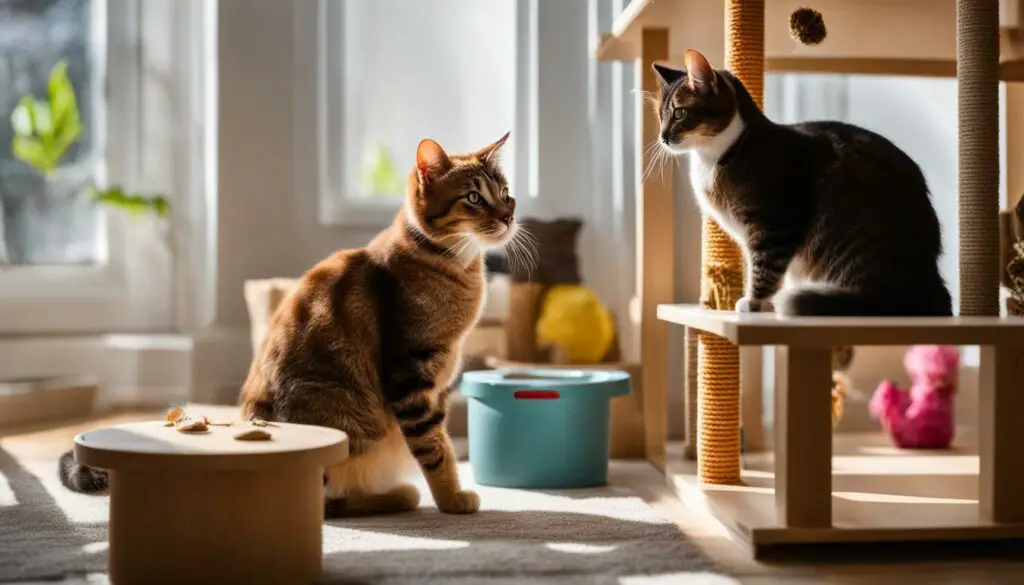
Medical Conditions and Veterinary Care
Excessive meowing in cats can sometimes be a symptom of underlying medical conditions. It’s important to seek veterinary care to determine the cause of your cat’s excessive meowing and provide appropriate treatment. Regular check-ups and monitoring your cat’s overall health are essential in addressing any health issues that may be contributing to the excessive meowing.
Some medical conditions that can cause excessive meowing in cats include:
- Hyperthyroidism: This condition occurs when the thyroid gland produces an excess amount of thyroid hormone. Symptoms may include weight loss, increased appetite, restlessness, and excessive vocalization.
- Kidney disease: Cats with kidney disease may experience increased thirst, increased urination, weight loss, and excessive vocalization.
- Cognitive dysfunction: Older cats can develop cognitive dysfunction, similar to Alzheimer’s disease in humans. This condition can cause confusion, disorientation, and changes in behavior, including excessive meowing.
These are just a few examples of medical conditions that can contribute to excessive meowing in cats. It’s essential to consult with a veterinarian to properly diagnose the underlying cause and develop a suitable treatment plan.
| Medical Condition | Symptoms | Treatment |
|---|---|---|
| Hyperthyroidism | Weight loss, increased appetite, restlessness, excessive vocalization | Medication, dietary management, radioactive iodine therapy, or surgery |
| Kidney Disease | Increased thirst, increased urination, weight loss, excessive vocalization | Dietary changes, medication, fluid therapy, and supportive care |
| Cognitive Dysfunction | Confusion, disorientation, changes in behavior, excessive vocalization | Environmental enrichment, medication, and supportive care |
Conclusion
Excessive meowing in cats can be a concerning behavior, and it’s important to address it both from a behavioral and medical perspective. Understanding the potential medical conditions that can contribute to excessive meowing and seeking veterinary care is crucial in ensuring your cat’s well-being. By providing appropriate treatment and management, you can help reduce your cat’s excessive meowing and improve their overall quality of life.

Conclusion
In summary, a cat that constantly meows for food may have various reasons behind this behavior. It could be due to hunger, attention-seeking behavior, stress, or even medical conditions. Understanding the underlying cause is crucial in addressing your cat’s excessive meowing and ensuring their well-being.
When trying to determine why your cat keeps meowing, it’s important to consider factors such as pain, urinary issues, loneliness, boredom, or even a desire for playtime. By identifying the root cause, you can take appropriate steps to address the problem.
If your cat is meowing at night, they may be seeking attention, companionship, or even experiencing medical issues such as hypertension. It’s vital to investigate the cause and provide the necessary support to ensure your cat’s comfort and well-being.
For kittens, excessive meowing is often a part of their development and communication skills. However, it’s crucial to monitor their meowing patterns and ensure it is not a sign of illness or discomfort.
If your cat is always hungry and meowing, it could be a symptom of an underlying medical condition such as hyperthyroidism or kidney disease. Consulting a veterinarian is essential for proper diagnosis and treatment.
If your cat’s meow suddenly sounds different or hoarse, it may indicate an upper respiratory infection or other health issues. It’s advisable to seek professional veterinary care to determine the cause of the change.
Male cats may yowl when they are looking for a mate, while female cats may yowl when in heat. Neutering or spaying can help minimize these behaviors.
If your cat won’t stop meowing, it’s crucial to identify the underlying cause and ensure their basic needs are met. Avoid rewarding attention-seeking behavior and consider behavior modification techniques or consulting a veterinarian for guidance.
By asking specific questions about your cat’s meowing habits, such as timing, location, and other factors, you can gain insights into their behavior and find effective ways to address excessive meowing.
Remember, excessive meowing can be a normal behavior or indicate underlying health issues. Consulting with a veterinarian is essential to determine the cause and provide appropriate treatment.
Providing environmental enrichment and utilizing behavior modification techniques can help alleviate boredom and modify your cat’s meowing behavior.
Lastly, regular veterinary care is crucial in addressing excessive meowing, as it may be a symptom of underlying medical conditions. Regular check-ups and monitoring your cat’s health are essential for their overall well-being.
In conclusion, excessive meowing in cats should not be ignored but rather investigated to ensure your cat’s needs are met and any underlying issues are addressed. Proper understanding and care will help improve your cat’s quality of life and strengthen your bond with them.
FAQ
Why does my cat keep meowing?
Cats meow for various reasons, including pain, urinary issues, kidney disease, hyperthyroidism, cognitive dysfunction, deafness or loss of hearing, hunger, thirst, loneliness, boredom, stress, breed traits, mating habits, attention-seeking behavior, learned behavior, and wanting to go out or play.
Why is my cat meowing at night?
Many cats are more active at night, and their meowing can be a way to seek attention, food, or companionship. It’s important to determine the underlying cause of the nighttime meowing, which could be boredom, hunger, medical issues like hypertension or hyperthyroidism, or simply a desire for interaction.
Why is my kitten meowing so much?
Kittens meow more frequently than adult cats as they are still developing their communication skills. They may meow to communicate their needs, seek attention, or express distress or pain. It’s essential to ensure that your kitten’s meowing is not a sign of illness or discomfort.
Why is my cat always hungry and meowing?
A cat that is constantly hungry and meowing may have a medical condition such as hyperthyroidism or kidney disease. It’s important to monitor their weight, appetite, and thirst levels, and consult a veterinarian for a proper diagnosis and treatment.
Why is my cat meowing differently?
If your cat’s meow suddenly sounds different, it could be a sign of an upper respiratory infection, laryngitis, or other underlying health issues. It’s advisable to have your cat examined by a veterinarian to determine the cause of the change in vocalization.
Why is my male cat yowling?
Male cats may yowl when they are looking for a mate, and this behavior is typically driven by hormones. Neutering can help reduce or eliminate this behavior. Female cats may also yowl when they are in heat. Spaying can prevent excessive yowling in female cats.
What to do if your cat won’t stop meowing?
It’s essential to determine the cause of your cat’s excessive meowing and address any underlying issues. Ensure that your cat’s basic needs are met, such as food, water, and a clean litter box. Avoid rewarding attention-seeking meowing and consider behavior modification techniques or consulting a veterinarian for guidance.
Questions to ask if your cat keeps meowing?
By asking specific questions about when and where your cat meows, you can gain insights into the triggers and reasons behind their behavior. Factors such as timing, location, spaying/neutering status, breed, litter box cleanliness, and playtime can provide valuable clues and help identify ways to address your cat’s excessive meowing.
Main causes of excessive meowing: insights from vets
Veterinary professionals emphasize that excessive meowing in cats can be normal behavior or indicate underlying health issues. It’s important to consult with a veterinarian to determine the cause and rule out any medical conditions that may require treatment.
Environmental enrichment and behavior modification
Environmental enrichment, such as providing interactive toys, puzzle feeders, and a variety of scratching posts, can help alleviate boredom and reduce excessive meowing. Behavior modification techniques, based on positive reinforcement and consistent training, can also be effective in modifying your cat’s meowing behavior.
Medical conditions and veterinary care
Excessive meowing can be a symptom of underlying medical conditions such as hyperthyroidism, kidney disease, or cognitive dysfunction. It’s crucial to seek veterinary care for proper diagnosis and treatment of these conditions. Regular check-ups and monitoring your cat’s overall health are essential to address any health issues that may be contributing to excessive meowing.
Source Links
- https://www.petmd.com/cat/behavior/cat-meowing
- https://www.thesprucepets.com/attention-seeking-behavior-in-cats-554033
- https://www.dutch.com/blogs/cats/excessive-meowing

